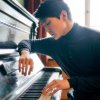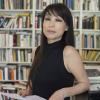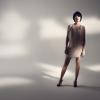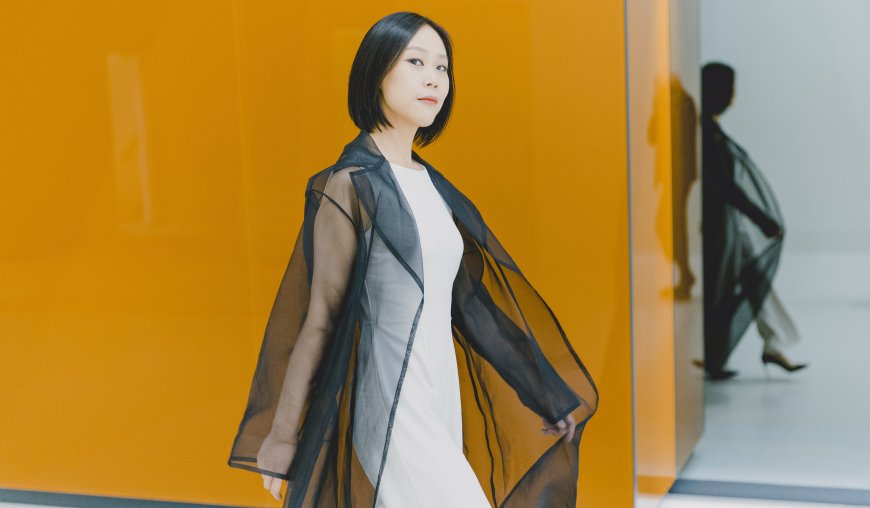
Since taking second prize at the 2009 Van Cliburn International Piano Competition, Yeol Eum Son, now 38, has continued to thrill audiences around the world. And April 25–27, she’ll be making her debut with the Los Angeles Philharmonic under the baton of Ryan Bancroft at Walt Disney Concert Hall, performing Mozart’s Piano Concerto No. 24.
Born in Wonju, South Korea, Son started piano lessons at age 3½ and was winning her first music competitions less than a decade later. After graduating from Korea National University of Arts, she pursued further studies in Germany.
Her development as a complete artist — recitalist, concerto soloist, and chamber musician — has wowed critics and audiences alike and earned her alliances with conductors ranging from Antonio Pappano to Jonathon Heyward to Andrew Manze to the late Lorin Maazel. This season alone, Son has debuted with the BBC Symphony Orchestra, Vienna’s Tonkünstler Orchestra, and the National Symphony Orchestra of Ireland.
Her vast repertoire spans classical masterpieces by composers such as J.S. Bach and Mozart to contemporary works by Rodion Shchedrin and Nikolai Kapustin. In addition to her fiendishly busy concert schedule, Son has released nine albums to date, including Modern Times (2016), a disc devoted to Kapustin (2021), and Mozart: Complete Piano Sonatas (2023).
SF Classical Voice spoke with Son over Zoom from Austin, Texas, where she was scheduled to perform with the Austin Symphony Orchestra. She discussed her upcoming LA Phil gig, her love of Mozart, and her unabashed fondness for writing — yes, she’s a published author! This conversation has been edited for concision and clarity.
Are you excited about making your debut with the LA Phil in Mozart’s Concerto No. 24, and who are some of your favorite Mozart interpreters?
I am excited, yes. The orchestra offered me to play Mozart, and I love this C-Minor Concerto. Of course, [there are] many pianists I adore so much as Mozart players, [such as] Alicia de Larrocha, and [Hungarian-born pianist] Lili Kraus was well known as a Mozart player, too. I can almost call [No. 24] my favorite Mozart concerto. It’s very unusual because it’s one of the few minor [key] concertos. It’s mysterious, and you can’t really define what it is. It always goes in some other direction than expected. I especially love the last movement — it wanders so much.
Have you worked with Ryan Bancroft before?
I did once with his BBC National Orchestra of Wales in Cardiff two years ago, playing [Sergei] Rachmaninoff’s Piano Concerto No. 3. It’s the only concert we’ve [so far done] together. I’m [also] playing with him in July at the Colorado Music Festival. I’m very much looking forward to playing with him again.
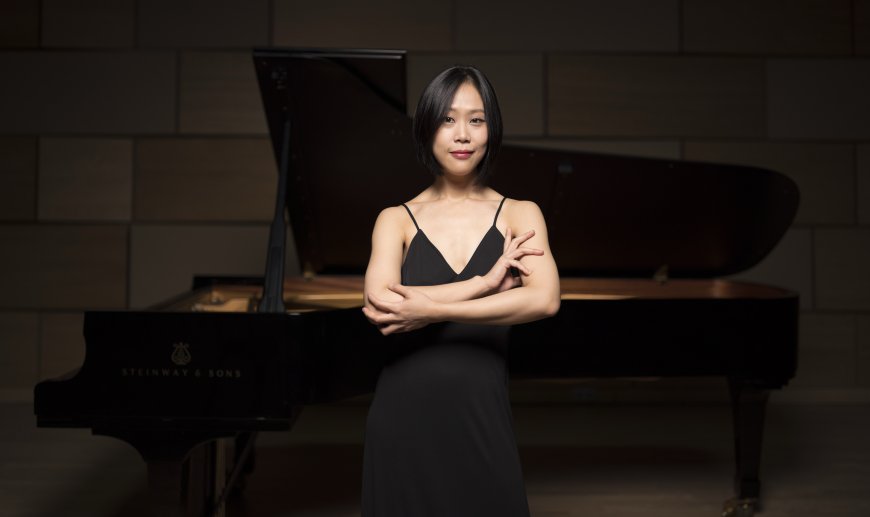
What about rehearsal time? How do you establish a connection with an orchestra — in this case, the LA Phil — when you have so few rehearsals?
Rapport with an orchestra is always a question. Whether we rehearse more or less depends. Sometimes [a piece] requires a lot of rehearsal, [but] when we over-rehearse, it’s not very good. With Mozart, we need some spontaneity and improvised ideas onstage. We have to respond to how [the music] is [in the moment], how the atmosphere works for us.
I’m wondering why you stayed in Korea for your studies until age 20 rather than going abroad earlier. And what were some of the challenges in being both Korean and a woman when you finally did move to Europe?
It was more common for all my friends — they were recognized as talented kids — to go to America or somewhere else. I couldn’t because of my family’s financial [situation]. Then I met my [first major] teacher when I was 13 and thought by then that I could stay in Korea and study further with him, which worked quite well.
I graduated, then went to Hanover, Germany, and had a teacher I fell in love with, [Israeli pianist] Arie Vardi. He’s still a mentor, and I regularly see him, [which is] one of the reasons I’ve stayed here. The [big] challenge has been that at some points in my life, I’ve felt like [European audiences] haven’t accepted non-European musicians because [we’re playing] European music [and so audiences] think it’s really theirs. Now it’s quite different. People are more open-minded.
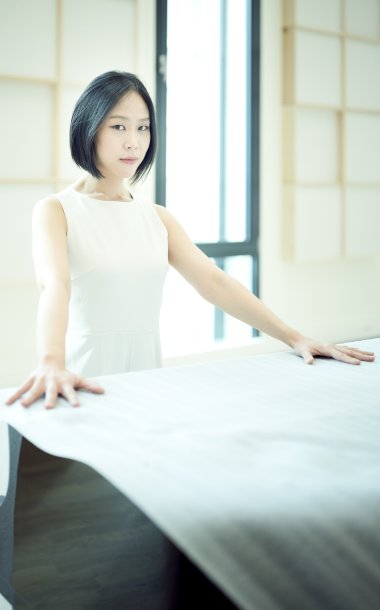
What about playing music by Korean composers, such as Unsuk Chin and Isang Yun, and new music in general?
One of the things I used to do a lot when I was a student was premiering almost a different work every week for our composer friends. Then I stopped doing it, [but] I recently started again. I have a few composer friends from Korea [involved in] upcoming projects, but maybe it’s too early to speak about.
I’m very much open to working with my contemporaries. I learn so much from them, [including] how to interpret [canonical] composers [better]. It’s nice and complementary.
Do you have a preference — performing with an orchestra, a chamber ensemble, or as a recitalist?
This is one of the things that keeps changing. In my 20s, I loved chamber music so much. My biggest passion was playing chamber music repertory. Now I love doing recitals. Concertos are a lot of fun, making music with a big group of musicians, and some conductors are hugely inspiring. [But] to be alone onstage and to make the show from beginning to end, it’s a big privilege. Even singers or violinists, they always have to play with a pianist, so a [solo] recital is a very unique experience.
I understand you were a monthly columnist for a leading South Korean paper, JoongAng Sunday, and then compiled the columns into a book, Letters From Hanover, which was intended for nonmusicians. I also read that you said you felt addicted to writing — as if you were an author rather than a pianist. Can you please elaborate on that?
Yes, I was working as a columnist, but it’s been many, many years. I was doing that from 2010 to 2016, for 6½ years. By then, I really loved doing it. I still love writing; it’s another passion in my life.
You can do a lot of things [in writing] that you cannot do in making music. Correcting [what you’ve done, for example], which you cannot do in a live concert. This is very satisfying, and you can try to be a perfectionist. In music, many things happen that you can’t change. [And] music is such an abstract thing — there are many things that you really cannot describe in words. I felt a sort of a thirst [when writing], the way I wanted to express something.
[Writing] was a great experience, but I stopped doing it after I started traveling a lot. I wish to write another book.
Last year, you released an album, Love Music, with your husband, violinist Svetlin Roussev, which features works by Franz Waxman, Erich Wolfgang Korngold, Fritz Kreisler, and others. How did you decide on the selections?
When we first thought about this album, we weren’t even dating. We were [only] duo partners. This repertory, because I’m such a big violin fan, I always wanted to record it. We [had the idea] a few years ahead of the real recording happening. We wanted to record some of those Austro-German composers like [Richard] Strauss and Kreisler, who is very different from Strauss. They’re very charming little pieces, and [the album just] somehow came later than we expected.
And your latest album, which is a live recording with The Hague Residence Orchestra under Chief Conductor Anja Bihlmaier, drops May 16.
Yes, it has the two [Maurice] Ravel concertos, the G-Major Concerto and the Concerto for the Left Hand, [the latter of] which [pianist and World War I veteran] Paul Wittgenstein commissioned. He also arranged the four little solo pieces by Bach [that are on the album]. The [Ravel performances] were from live concerts, and we had had a bit of rehearsal.
Speaking of albums, in 2016 you performed Mozart’s Concerto No. 21 with the Academy of St Martin in the Fields and Neville Marriner, which proved to be the conductor’s final recording. What are your memories of that?
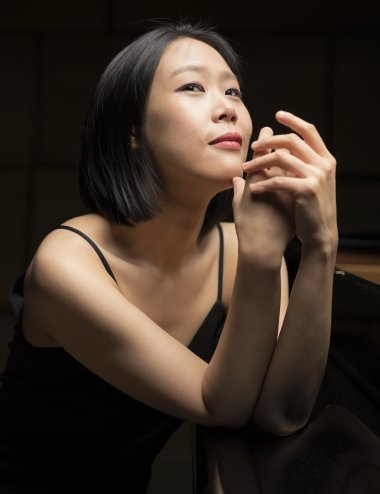
We first played together in 2015, and we loved each other by [the end of] the first meeting. I was a big admirer anyway. He was such a great musician. I still remember how he rehearsed. He was so passionate, even at his age [92]. You might think he was accomplished and [just going] from one place to another, [but] he was passionately rehearsing.
At the same time, he was very open-minded, very encouraging. Whatever I wanted to do, he would always listen to me. I have [had] other experiences working with great maestros who had their own ways, but Neville was not one of them.
You always look very chic on your album covers and in your Instagram posts. What do you, as a fellow pianist, think of Yuja Wang’s performance attire, including her stilettos, and what role should clothes play in a performance?
As long as you like what you’re wearing — it has to start from that. I can’t really picture myself doing the same [because] I don’t like wearing minidresses. I love wearing stilettos, high heels, but not platform ones. When I play piano, for me higher heels work better for the pedals. They become support. It just depends on how you’re trained.
Shoes aside, where do you see yourself in the next five to 10 years?
It’s hard to tell, hard to foresee. The more and more I think about it — it doesn’t matter where or how I’m [making a career] — I just want to be original and unique in what I’m doing. I want to create an original path.


